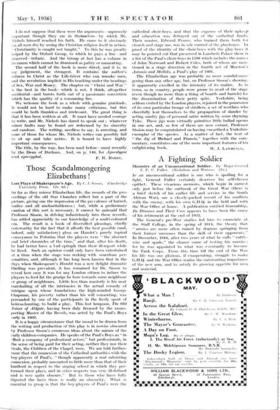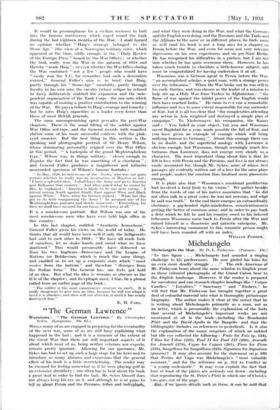A Fighting Soldier
Memoirs of an Unconventional Soldier. By Major-General J. F. C. Fuller. (Nicholson and Watson. 21s.) Iv an unconventional soldier is one who is spoiling fur a light, General Fuller certainly deserves his self-chosen epithet. These vivacious memoirs, which begin in earnest, only just before the outbreak of the Great War (there is a brief sketch of his earlier life and service in the South African War), are a closely-packed record of his conflicts , with the enemy, with his own G.H.Q. in the field and with the War Office at home. A publication entitled Generalship, Its Diseases and Their Cure appears to have been the cause of his retirement at the end of 1933.
The General's pre-War studies led Wm to enunciate at the Staff College, in the • spring of 1914, the theory that " armies are more -often ruined by dogmas springing from their former successes than the skill of their opponents." In December, 1916, after two years of what he calls " cattle- wire and spade," the chance came of testing his maxim ; for he was appointed to what was eventually to become the Tank Corps. From this time till the end of the War his life was one glorious, if exasperating, struggle to make G.H.Q. and the War 011ice realise the outstanding importance of the new arm, and to satisfy its growing appetite for melt and material.
It would be presumptuous for a civilian reviewer to butt into the famous controversy which raged round the tank_ during the last 'eighteen months of the:Wire. shall hazard_. no opinion whether " Haig's strategy belonged to the Stone Age " (the view of a Norwegian military critic, which appeared at the time, oddly enough, in the " Daily Review of the Foreign Press " issued by the War Office)-; or whether , the tank really won the War in the autumn of 1918 and thereby " made Haig" ; or even whether the War Office during the War contained " not a few " people who would have " easily won the V.C. for cowardice had such a decoration existed." General Fuller's case is, in brief, that Haig, partly through his " Stone-Age " mentality, partly through loyalty to his own arm, the cavalry (whose eclipse he refused to face), deliberately crabbed the expansion and the inde- pendent organisation of the Tank Corps—the one arm which was capable of making a positive contribution to the winning of the War. He pays a tribute to Haig's courage and tenacity ; but he rates Haig's capacities as a leader even lower than those of most British generals.
The same uncompromising spirit pervades the post-War chapters. There is the usual tilting of the soldier against War Office red-tape, and the General records with manifest elation some of his more successful contests with the pink- eyed monster. But the best thing in this section is the speaking and photographic portrait of Sir Henry Wilson, Whose dominating personality reigned over the War Office at this period. " A harlequin of the grand Mephistophelean type," Wilson was, in things military, " clever enough to disguise the fact that he was something of a charlatan " ; and General Fuller produces a magnificent and hitherto unrecorded specimen of Wilson's famous boutades : •
" In May, 1920, he said to one of the frocks,' who was not quite pertain whether he really was an incarnation of Minerva or not :
I have a splendid idea. I shall leave the Army and go to America and Balkanise that country.' And when asked what he meant by this, he explained : ' America is likely to be our next enemy. I intend setting North against South, East against West and Black aFainst White.' Then, when his listener replied ; ' What has this got to do with reorganising the Army ? ' he assumed one of his Mephistophelean postures and slowly answered : ' Everything, for then we shall have no need for our funny little army at all.' " It is a mischievous portrait. But Wilson was one of the
most mischievous men who have ever held high office in this country.
• In this last chapter, entitled " Synthetic Iconoclasm," General Fuller gives his views on the world of today. He thinks that all would have been well if only the belligerents had said to each other in 1919: " We have all made fools of ourselves, let us shake hands and mend what we have shattered." This would presumably have delivered us
from his two bugbears—Democracy and the League of Nations (or Bolshevism, which is much the same thing), and enabled us to set' -up a corporate state which " must evolve from the bottom " and therefore " diverges from the Italian form." The General has, one feels, got hold
of an idea. But what the idea is remains as obscure as the title of the chapter ; and its epitaph must, I fear, be a phrase culled from an earlier page of the book :
"The soldier is the most ccau3ervative creature on earth. It-is really dangerous to giye him an idea, because he will not adopt it Until it is obsolete,' and then will not abandon it until it has nearly destroyed him."
E. H. CARR.















































 Previous page
Previous page